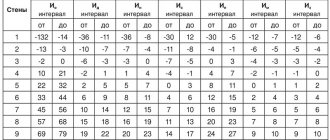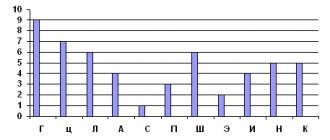The online test for introvert and extrovert will allow you to better know yourself and your inclinations - whether you are more of an introvert or an extrovert. In their pure form, these extremes are extremely rare; most people are of the mixed type. Introverts have many traits that extroverts have, and vice versa. They manifest themselves depending on the degree of severity, character, upbringing and many other factors.
Jung's online temperament test will help you reliably determine your personality type. It includes only 20 questions, so it will take no more than 5 minutes to complete . It is suitable for all adults and equally informative for men and women. Often used by psychologists in high schools to determine the personality type of students.
Knowing your personality type will help you better understand yourself, your needs and desires. In the future, this will help improve social adaptation in any team. Determining personality type can also be part of the work of a practicing psychologist. This knowledge will help to reveal the patient’s hidden needs and realize them, finding their place in life.
Extroverts and introverts
Extroverts are usually called active and sociable people. Their energy is directed outward, they easily make new acquaintances, are energetic and positive. Often dependent on other people's opinions. Easy-going, they prefer noisy companies to solitude. Actions are often impulsive, performed spontaneously, under the influence of emotions.
Introverts are their complete opposite. Energy is focused more on the inner world. They are reasonable and silent. They prefer privacy to large groups. The circle of communication is often narrow, new people are reluctantly and difficultly accepted into it. Decisions are often made carefully, after careful consideration. Prone to introspection, reflection and experience. They often have an analytical mind.
There is a third, intermediate personality type. Most people belong to him. Depending on the situation, they exhibit traits of both extroverts and introverts.
Online temperament test: description of scales
Sincerity scale
This scale is designed to increase the frankness of responses. A high result on it may indicate insincerity in taking the test. Or it may reflect pretense and demonstrative behavior in order to obtain constant social approval. Try to take the test honestly, without thinking about the impression your answers might make on someone.
Extraversion-Introversion Scale
This scale reflects the tendency towards extraversion or introversion. People who are commonly called extroverts tend to be sociable and outward-looking. They are full of energy, and they simply need new acquaintances and challenges. They are characterized by the following features: hot temper, impulsiveness, good nature, carelessness. They prefer to act quickly, on the spur of the moment. They are also prone to taking risky actions. They rarely fully control their emotions and actions.
Introverts are the complete opposite. They are more often turned inward, closed, calm, and shy. They are prone to introspection, control of their thoughts and emotions. Such people carefully think through their actions and rarely trust sudden impulses. Their social circle is often narrow. The character is dominated by pessimism and a high value of social and moral norms.
In reality, most people are somewhere between these two extremes. Depending on the context of the situation, either one or the other traits may predominate in us.
Neuroticism scale
The Neuroticism Scale helps characterize emotional stability or instability. People with high levels of neuroticism are usually subject to rapid mood swings and are emotionally unstable. They are also often prone to excessive soul-searching, worrying, and catastrophizing. They may be irritable, anxious and restless. A high level of neuroticism is also characterized by strong reactions to any negative stimuli. Under unfavorable conditions, people with high scores on this scale are prone to the appearance of neurosis.
Psychoticism scale
The psychoticism scale indicates a tendency to inappropriate reactions and antisocial behavior. People with high scores on this scale have difficulty adapting to society. It is difficult for them to work with people, they can be conflicting and non-communicative.
Test for introvert and extrovert online: start taking it
Just below you can take the introvert and extrovert test online. The results will be available immediately on the same page. In addition, you can also answer the questions presented in the Eysenck Temperament Test and compare your results. Find out your personality type now!
Time limit: 0
Navigation (job numbers only)
0 out of 20 tasks completed
Questions:
- 1
- 2
- 3
- 4
- 5
- 6
- 7
- 8
- 9
- 10
- 11
- 12
- 13
- 14
- 15
- 16
- 17
- 18
- 19
- 20
Information
Instructions: For each of the 20 questions there are 2 answer options. Check the one that suits you best. There is no time limit for taking the test, but try to pass it “in one go” without delay =)
You have already taken the test before. You can't start it again.
The test is loading...
You must log in or register in order to begin the test.
You must complete the following tests to start this one:
results
Time's up
You scored 0 out of 0 points (0)
Categories
- No category 0%
- You are a pronounced extrovert.
Scores from 0 to 35 indicate introversion. From 36 to 65 – ambiversion (the so-called intermediate or indeterminate type). From 66 to 100 points – extraversion. - You are an ambivert.
Scores from 0 to 35 indicate introversion. From 36 to 65 – ambiversion (the so-called intermediate or indeterminate type). From 66 to 100 points – extraversion.
- You are a pronounced introvert.
Scores from 0 to 35 indicate introversion. From 36 to 65 – ambiversion (the so-called intermediate or indeterminate type). From 66 to 100 points – pronounced extraversion.
- 1
- 2
- 3
- 4
- 5
- 6
- 7
- 8
- 9
- 10
- 11
- 12
- 13
- 14
- 15
- 16
- 17
- 18
- 19
- 20
- With answer
- With a viewing mark
- Task 1 of 20
1.
What do you prefer?
- Task 2 of 20
2.
What books do you prefer to read?
- Task 3 of 20
3.
What would you rather allow in your work?
- Task 4 of 20
4.
If you do something bad, then:
- Task 5 of 20
5.
How do you get along with people?
- Task 6 of 20
6.
Do you consider yourself touchy?
- Task 7 of 20
7.
Are you inclined to laugh, to laugh heartily?
- Task 8 of 20
8.
Do you consider yourself:
- Task 9 of 20
9.
Are you frank or secretive?
- Task 10 of 20
10.
Do you like to analyze your experiences?
- Task 11 of 20
11.
When in society, do you prefer:
- Task 12 of 20
12.
Do you often feel dissatisfied with yourself?
- Task 13 of 20
13.
Do you like to organize things?
- Task 14 of 20
14.
Would you like to keep an intimate diary?
- Task 15 of 20
15.
Do you move quickly from decision to execution?
- Task 16 of 20
16.
Does your mood change easily?
- Task 17 of 20
17.
Do you like to convince others and impose your views?
- Task 18 of 20
18.
Your movements:
- Task 19 of 20
19.
You are very worried about possible troubles:
- Task 20 of 20
Adapted by A. G. Shmelev
online version of the Eysenck EPi test
The EPI test questionnaire (1963) confidently ranks first in frequency of use among other psychodiagnostic techniques.
| № | Contents of statements | Yes | No |
| 1 | Do you often feel a craving for new experiences in order to distract yourself and experience a strong sensation? | ||
| 2 | Do you often feel that you need friends who can understand, approve, and express sympathy? | ||
| 3 | Do you consider yourself a carefree person? | ||
| 4 | Is it very difficult for you to give up your intentions? | ||
| 5 | Do you think about your affairs slowly and prefer to wait before acting? | ||
| 6 | Do you always keep your promises, even if it is unprofitable for you? | ||
| 7 | Do you often have ups and downs in your mood? | ||
| 8 | Do you usually act and speak quickly and do you spend a lot of time thinking? | ||
| 9 | Have you ever had the feeling that you are unhappy, although there was no real reason for this? | ||
| 10 | Is it true that you can decide on anything in a dispute? | ||
| 11 | Do you feel embarrassed when you want to meet someone of the opposite sex who you like? | ||
| 12 | Does it happen that when you get angry, you lose your temper? | ||
| 13 | Do you often act thoughtlessly, on the spur of the moment? | ||
| 14 | Do you often worry about the idea that you shouldn't have done or said something? | ||
| 15 | Do you prefer reading books to meeting people? | ||
| 16 | Is it true that you are easily offended? | ||
| 17 | Do you often like to be in company? | ||
| 18 | Do you sometimes have thoughts that you would not like to share with other people? | ||
| 19 | Is it true that sometimes you are so full of energy that everything “burns” in your hands, and sometimes you feel very lethargic? | ||
| 20 | Do you try to limit your circle of acquaintances to a small number of your closest friends? | ||
| 21 | Do you dream a lot? | ||
| 22 | When people shout at you, do you respond in kind? | ||
| 23 | Do you often feel guilty? | ||
| 24 | Are all your habits good and desirable? | ||
| 25 | Are you able to give free rein to your feelings and have a lot of fun in a noisy company? | ||
| 26 | Can we say that your nerves are often tense to the limit? | ||
| 27 | Are you considered a lively and cheerful person? | ||
| 28 | After something is done, do you often return to it in your mind and think that you could have done it better? | ||
| 29 | Is it true that you are usually silent and reserved when you are among people? | ||
| 30 | Does it happen that you spread rumors? | ||
| 31 | Does it ever happen that you can’t sleep because different thoughts come into your head? | ||
| 32 | Is it true that it is often more pleasant and easier for you to read about what interests you in a book, although you can quickly and easily learn about it from friends? | ||
| 33 | Do you have palpitations? | ||
| 34 | Do you like work that requires close attention? | ||
| 35 | Do you have tremors? | ||
| 36 | Is it true that you always say only good things about people you know, even when you are sure that they will not know about it? | ||
| 37 | Is it true that you find it unpleasant to be in a company where they constantly make fun of each other? | ||
| 38 | Is it true that you are irritable? | ||
| 39 | Do you like work that requires quick action? | ||
| 40 | Is it true that you are often haunted by thoughts about various troubles and “horrors” that could happen, although everything ended well? | ||
| 41 | Is it true that you are leisurely in your movements? | ||
| 42 | Have you ever been late for a date or work? | ||
| 43 | Do you often have nightmares? | ||
| 44 | Is it true that you are such a lover of conversation that you never miss an opportunity to talk with a stranger? | ||
| 45 | Do you have any pain? | ||
| 46 | Would you be upset if you couldn't see your friends for a long time? | ||
| 47 | Would you call yourself a nervous person? | ||
| 48 | Are there people you know that you clearly don’t like? | ||
| 49 | Are you easily offended by criticism of your shortcomings or work? | ||
| 50 | Would you say that you are a confident person? | ||
| 51 | Is it difficult to truly enjoy events with many participants? | ||
| 52 | Does the feeling that you are somehow worse than others bother you? | ||
| 53 | Would you be able to bring some life into a boring company? | ||
| 54 | Does it happen that you talk about things that you don’t understand at all? | ||
| 55 | Are you worried about your health? | ||
| 56 | Do you like to make fun of others? | ||
| 57 | Do you suffer from insomnia? |
Questionnaire code
Sincerity : answers “yes” to questions 6, 24, 36;
answers “no” to questions 12, 18, 30, 42, 48, 54.
Extraversion: “no” answers to questions 5, 15, 20, 29, 32, 34, 37, 41, 51
answers “yes” to questions 1, 3, 8, 10, 13, 17, 22, 25, 27, 39, 44, 46, 49, 53, 56.
Neuroticism: answers “yes” to questions 2, 4, 7, 9, 11, 14, 16, 19, 21, 23, 26, 28, 31, 33, 35, 38, 40, 43, 45, 47, 50, 52, 55, 57.
Interpretation of indicators on the “Sincerity” scale
| Numerical indicator | Interpretation |
| 0-3 | Frank |
| 4-6 | Situational |
| 7-9 | False* |
* It should be noted that in this case we are talking only about the degree of sincerity when answering test questions, and not at all about deceit as a personal characteristic.
Interpretation of indicators on the “Extraversion” and “Neuroticism” scales
| Numerical indicator | 0-2 | 3-6 | 7-10 | 11-14 | 15-18 | 19-22 | 23-24 |
| Interpretation for the Extraversion scale | Super introvert | Introvert | Potential introvert | Ambivert | Potential extrovert | Extrovert | Super extrovert |
| Numerical indicator | 0-2 | 3-6 | 7-10 | 11-14 | 15-18 | 19-22 | 23-24 |
| Interpretation for the Neuroticism scale | Super Cordant | Concordant | Potential concordant | Normosthenik | Potential Discordant | Discordant | Overly discordant |
PROCESSING RESULTS
First, you need to process the results on the “Sincerity” scale. It diagnoses your tendency to give socially desirable answers. If this indicator exceeds 5 points, then we can say that, unfortunately, you were not sincere when answering the test questions.
Then you should calculate the sum of points for each indicator, awarding one point for each answer that matches the key.
Having compared the results obtained on the “Extroversion” and “Neuroticism” scales with the interpretation in the tables, plot on the diagram (see figure) the results obtained on the “introversion - extraversion” scale and on the “neuroticism” scale (emotional stability - instability). The combination of characteristics on two scales will indicate your temperament type.
"Circle" by Eysenck
You have determined your temperament type. Each of the four types is based on special combinations of properties of the nervous system:
- a choleric person has a strong nervous system, he easily switches from one thing to another, but the imbalance of his nervous system reduces compatibility (accommodation) with other people. Choleric people are prone to sudden changes in mood, are quick-tempered, impatient, and prone to emotional breakdowns;
- a sanguine person also has a strong nervous system, which means good performance, he easily moves on to other activities, to communicating with other people. The sanguine person strives for frequent changes of impressions, easily and quickly responds to ongoing events, and experiences failures relatively easily;
- a phlegmatic person has a strong, efficient nervous system, but he has difficulty getting involved in other work and adapting to a new environment. A phlegmatic person has a calm, even mood. Feelings are usually constant;
- melancholic is characterized by a low level of mental activity, slowness of movements, restraint of facial expressions and speech, and rapid fatigue. He is distinguished by high emotional sensitivity to everything that happens around him. Sensitivity to others makes melancholic people universally agreeable (compatible) with other people, but the melancholic person himself tends to experience problems within himself and, therefore, is prone to self-destruction.
The indicator “Introversion - Extraversion” characterizes a person’s individual psychological orientation either (primarily) to the world of external objects (extraversion) or to the internal subjective world (introversion). It is generally accepted that extroverts are characterized by sociability, impulsiveness, behavioral flexibility, great initiative (but low persistence) and high social adaptability. Extroverts usually have external charm, are straightforward in their judgments, and, as a rule, are guided by external assessment. They cope well with work that requires quick decision making.
Introverts are characterized by unsociability, isolation, social passivity (with sufficient persistence), a tendency to introspection and difficulties in social adaptation. Introverts cope better with monotonous work; they are more careful, neat and pedantic.
Ambiverts (see table) have traits of extra- and introversion. Sometimes, to clarify this indicator, additional examination using other tests is recommended for individuals.
The neuroticism indicator characterizes a person in terms of his emotional stability (stability). This indicator is also bipolar and forms a scale, on one pole of which there are people characterized by extreme emotional stability, excellent adaptation (indicator 0-11 on the “neuroticism” scale), and on the other - an extremely nervous, unstable and poorly adapted type (indicator 14- 24 on the neuroticism scale).
Emotionally stable (stable) - people who are not prone to anxiety, resistant to external influences, inspire trust, and are prone to leadership.
Emotionally unstable (neurotic) - sensitive, emotional, anxious, prone to painful failures and upset over little things.
Each type of temperament is naturally determined; one cannot talk about “good and bad” temperaments, one can only talk about different ways of behavior and activity, about the individual characteristics of a person. Each person, having determined the type of his temperament, can more effectively use his positive traits.
BIBLIOGRAPHY
- Abramova G.S. Developmental psychology: A textbook for university students. – Ekaterinburg: Business book, 1999.
- Burlachuk L. Psychodiagnostics. – St. Petersburg: Peter, 2002. – 352 p.: ill. – (Series “Textbook of the New Century”). ISBN 5-94723-045-3
- Burlachuk L.F., Morozov S.M. Dictionary-reference book for psychological diagnostics. — Kyiv 1989.
- Godefroy J. What is psychology. In 2 volumes. T.1. – M.: Mir, 1991. – P. 370–377.
- Kon I.S. In search of oneself: personality and its self-awareness. – M., 1984.
- Brief psychological dictionary / Comp. L.A. Karpenko; under general Ed. A.V. Petrovsky, M.G. Yaroshevsky. – M.: Politizdat, 1985.
- Nemov R.S. Psychology. In 3 volumes. T.3. – M., VLADOS, 1999.
- Platonov K.K. A brief dictionary of the system of psychological concepts. - M., 1984.
- Practical psychology in tests, or how to learn to understand yourself and others. – M.: AST-PRESS, 1999. – 376 p.: ill. (“Pedagogy, psychology, medicine”).
- Practical psychology: Textbook / Ed. Doctor of Psychology Sciences, prof., academician BPA M. K. Tutushkina - 4th ed., revised, additional. - St. Petersburg: Publishing house "Didactics Plus", 2001. - 368 p. ISBN 5-89239-014-4
- Rubinshtein S.L. Fundamentals of general psychology - St. Petersburg: Peter, 2000. - P. 177 –225.
- Stolyarenko L.D. Fundamentals of Psychology - Rostov-on-Don: Phoenix, 2000 - pp. 136–164.
- Reader on general psychology. Psychology of thinking / Under. ed. Yu.B. Gippenreiter, V.V. Petukhova. – M.: Moscow State University Publishing House, 1981. – P. 11–152.
INTRODUCTION
Ordinary people and professional scientists alike ask many questions related to the concept of “personality.”
Ordinary people are interested in questions of the following type: What is a personality conflict? Can people like each other who, from the point of view of personality psychology, are complete opposites? Does it happen that a person’s personality is weakly expressed or absent altogether? For non-professionals, scientific questions are also of interest, among which may be, for example, the following: How much does personality change over time? What factors determine (form, determine) a person’s personality? What are the main personality characteristics? To what extent do personality differences (in and of themselves) influence outcomes such as health status? Why does a person become an introvert or an extrovert, and most often an ambivert? Thus, the question of the nature of intro- and extroversion is quite relevant now. In our work we will touch upon the definition of these concepts, their nature and personality theories associated with them, as well as some methods with which one can study personality for intro- or extroversion.
So, the goal
Our work is to reveal the concepts of intro- and extroversion and describe the methods of their research.
In accordance with the goal, it is necessary to solve the following tasks:
- analyze the literature on the phenomena under study;
- describe the definitions of the phenomena being studied;
- reveal their specifics;
- describe methods for studying introversion and extroversion.
Types of introverts
Logical-Intuitive introvert (Robespierre)
- Has a strong analytical mind.
- Capable of developing new revolutionary methods.
- Loves solitude and quiet office work.
- Unpretentious and ascetic.
- Doesn't take care of himself.
- Feels calm in a place well protected from prying eyes.
Features of an unstable introvert
To the previous characteristics for this personality type should be added:
- High sensitivity to negative stimuli.
- Suspiciousness, tendency to negative forecasting, dramatization of events.
- Self-doubt, low self-esteem, timidity.
- “Blurring” of personality boundaries.
- They do not tolerate prolonged loneliness well and are dependent on social contacts.
- Fatigue, nervous system rigidity.
- Stiffness.
- Bad or inappropriate jokes.
- Emotions are poorly controlled.
Concepts
Carl Jung considered the main criterion distinguishing extroverts and introverts to be “the direction of libido movement.” According to Jung, extraversion is manifested in the direction of a person’s libido (vital energy) towards the outside world, in the fact that the extrovert prefers social and practical aspects of life, operations with real external objects, and the introvert prefers immersion in the world of imagination and reflection. An extrovert is aimed at wasting his own energy, moving it towards surrounding objects, an introvert is aimed at accumulating, moving energy into the inner world. Introversion is one of the archetypal manifestations of the collective unconscious. Analyzing the differences in the concepts of two other prominent representatives of dynamic psychology, Sigmund Freud and Alfred Adler, Jung believes that the essentially similar concepts of these authors differ due to the different fidelity of their authors. If the first, according to Jung, is an introvert, which forces him to look for the mechanisms of the psyche in the depths of the inner world, then the second, being an extrovert, considers the human psyche in a social context, considering the desire for social superiority as the basis of libido.
Hans Eysenck borrows the term “extraversion” from Jung when creating his dispositional model. Eysenck found that across different studies conducted by different research groups, personality dimensions varied consistently in the degree to which they were oriented towards social relationships as opposed to being oriented toward reflection, experiences, and feelings. These concepts are the poles of a superfactor - a complex of personality traits that correlate with each other, which is determined genetically. A typical extrovert, according to Eysenck, is sociable, optimistic, impulsive, has a wide circle of acquaintances and poor control over emotions and feelings. A typical introvert is calm, shy, distant from everyone except close people, plans his actions in advance, loves order in everything and keeps his feelings under strict control. The Jungian term came in handy in this situation. Moreover, it turns out that extraversion may be one of the basic personality traits, of which Eysenck eventually identified three.
In psychiatry, the interpretation of Leonhard is widespread, who borrowed the earliest interpretation of these concepts according to Jung and rethought it: according to Leonhard, an extrovert is a weak-willed person, subject to influence from the outside, an introvert is a strong-willed person. At the same time, Leonhard's typology is psychiatric, not psychological, and relates primarily to pathologies. If we are not talking about pathologies, then close to Leonhard’s (but not Jung’s) interpretation of this term are such psychological terms as locus of control (internal and external), externalism and internalism (R.L. Ackoff, etc.). Into psychiatry Eugen Bleuler introduced the concept of autism, a symptom of schizophrenia, which is largely covered by Jung's concept of “introversion.” Autism is a pathological introversion, accompanied by an active withdrawal from the outside world.
Subsequently, extraversion as a personality trait shows its validity, remaining in such modern models as the Big Five () or HEXACO ().
What will a temperament test show?
Knowing your scores on the extraversion and neuroticism scales, you can determine your temperament type. To do this, you need to use the Eysenck circle, which is presented in the test results. A sanguine person is defined by high scores on extraversion and low scores on neuroticism. Phlegmatic - low scores on extraversion and low on neuroticism. Choleric – high scores on extraversion and high on neuroticism. Melancholic – low scores on extraversion and high on neuroticism.
Average values indicate a mixed type of temperament. For example, average scores on extraversion and high scores on neuroticism mean that your temperaments are melancholic and choleric. Take the online temperament test now! Other online psychological tests are also available on the site.
The history of the appearance of the terms “introvert” and “extrovert”
Since 1755, the concepts of “introvert” and “extrovert” have been present in English dictionaries. However, they appeared in scientific circles at the beginning of the 20th century thanks to the Swiss psychiatrist Carl Gustav Jung, a student of Sigmund Freud.
In his book “Psychological Types,” he gave a detailed description of each of them. Fundamental was the human libido. Unlike Freud, Jung included in this concept not only the sexual aspect, but also behavior and human needs in various life situations.
Based on this, introverts (from the Latin intro - inside) are people whose vital energy is turned inward. For them, personal inner peace is of great importance. Extroverts (from the Latin extra - out, outside), on the contrary, receive a charge of energy by directing emotions to the outside world.
For clarity, we can give an example of how Jung himself described his friends belonging to different psychotypes. Volodya (an extrovert) is open, you can share all your sorrows with him. Having told him about your problem, you can confidently say that he will solve it by turning to one of his many friends for help. German Semenovich (an introvert, a close friend of the scientist) is very reserved. In his presence, you intuitively gather yourself and pull yourself together; meetings with him are always interesting. After listening to the interlocutor, he will analyze the situation and find all the pitfalls and nuances in it.
How to communicate with an introvert?
Due to their special type of thinking, it is necessary to find your own approach to introverts. First of all, it should be remembered that an introvert is extremely jealous of his personal space. He is not ready to let everyone in there. Earning the trust of an introvert is a long and thorny path. But the result of such efforts will exceed all expectations, because introverts are faithful and reliable life partners.
Secondly, it is advisable to choose words and respect the inner world of an introvert. They remember grievances for a long time, and if they are “touched to the quick,” then the matter will not end with just “I’m sorry.”
Thirdly, introverts do not like turmoil and crowds of people; it makes no sense to drag them to noisy parties, rallies and mass celebrations. If you are planning a meeting with an introvert, it is better to invite him to nature, to a visit or a quiet secluded place, somewhere in a cozy establishment.
These are tips for communicating with introverts. What to do if you yourself are prone to introversion?










